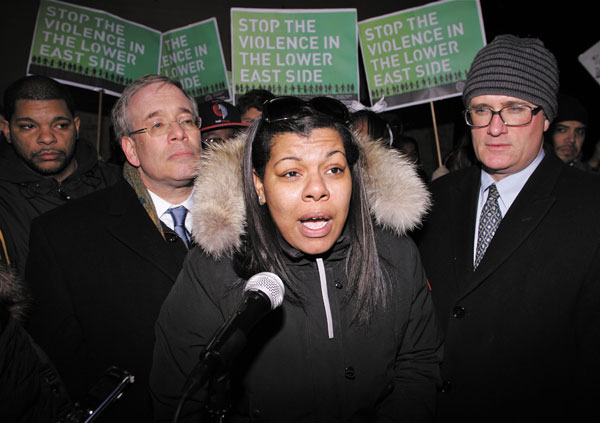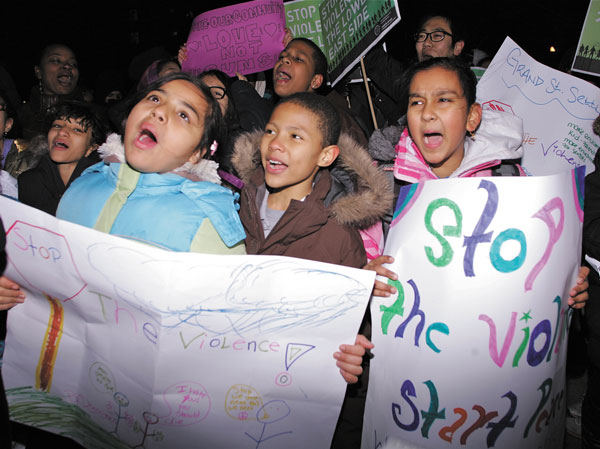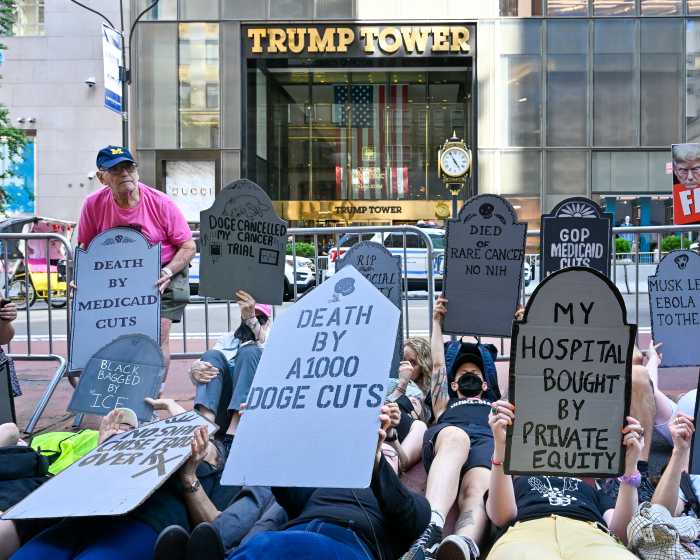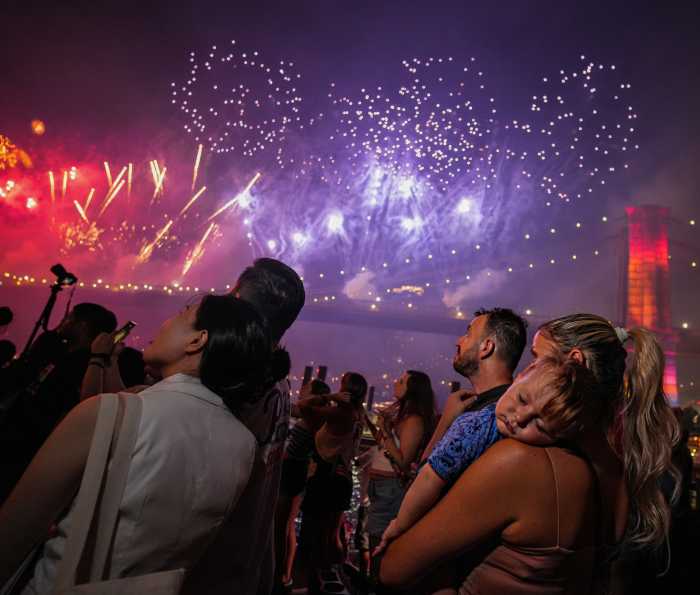
BY SAM SPOKONY | Just after hundreds of Lower East Side parents and children walked together in an emotional rally against gun and youth violence, the mother of Raphael Ward — the 16-year-old Baruch Houses resident who was shot and killed on Jan. 4 — spoke candidly and forcefully to that crowd. Though she never would have asked to be placed upon this pedestal of grief, Arlene Delgado knew that the happy memories of her child might just be enough to spur the change her neighborhood needs.
“I’m strong because of the kids,” said Delgado, who didn’t shed a tear until after she stepped away from the microphone. “If it took my son’s death to save all the kids in my community — if that’s the sacrifice that had to be made — then let’s make a change that way.”
The Jan. 31 unity rally, which was organized and led by a broad coalition of youth-based organizations, settlement houses and elected officials, began at the corner of E. Sixth St. and Avenue D, and concluded near the corner of Columbia and Rivington Sts., just steps away from where Ward was murdered.
And although so many mourners continue to turn to religion in this, and other, times of crisis, Delgado called on her neighbors to never lose sight of their personal responsibilities.
“We’re gonna pull through this together,” she said. “But it’s us, the parents — we have to do this. We have to be more proactive. We can’t just let them walk out the door and say, ‘God protect my baby, I’ll leave it in God’s hands, I know my son’s going to be fine.’ That’s not it. It’s us, along with God.”

Those words echoed a fast-growing sentiment among a community — one dominated by public housing — whose residents and representatives say it is dangerously lacking in positive youth programs, antiviolence outreach and support for struggling, low-income parents.
Later, Delgado also announced that a sports-oriented youth foundation will soon be created in her son’s name, while adding that it is still in the early planning stages.
Numerous other speakers also highlighted the need for an even stronger reaction to the plague of illegal guns that grips the Lower East Side, as in so many other neighborhoods within this city, as well as throughout the nation.
Assemblymember Brian Kavanagh, who last week called for another district attorney-sponsored gun buyback event — which allows people to anonymously turn in firearms in exchange for cash — drilled those points home once again after the Jan. 31 rally.
“We’ve been to many of these events in our community,” Kavanagh said, “where we’ve had to ask: Why? Why does this have to happen again and again? And part of it is that people, when they look around and believe they see danger within their community, they think, ‘I have to arm myself too. I have to get a gun. I have to be careful. I have to be ready.’
“But we have to make sure that people understand,” he continued, “that if you’re picking up a gun, you’re only making yourself more vulnerable, you’re making other people more vulnerable, and you’re only bringing on another tragedy. We just don’t need the guns in this community.”
The Lower East Side’s first gun buyback event, last October, took 50 guns off the street. More recently, officials announced that a Feb. 2 buyback in Brooklyn took in 113 weapons.
A representative of the Manhattan D.A.’s office said, at a Jan. 17 community forum, that the office is considering holding another buyback — and Kavanagh recently said that he has been part of those discussions for the past several weeks.
And those two powerful messages — one of parent and community responsibility, and another of antigun fervor — were perhaps most eloquently juxtaposed by Jackie Rowe-Adams, who co-founded the group Harlem Mothers SAVE (Stop Another Violent End) in 2006 after losing two sons to gun violence.
“You want to talk about stop and frisk? Frisk your kids before they leave the house!” Rowe-Adams said. “Parents need to stay involved. Yeah, it’s about getting more programs, but you need to take your kids there. You gotta get up, get out from in front of the TV, stop smoking weed with your kids — yeah, I said it! — and take care of your kids and pay attention.”
At one point, she also led the crowd in a chant to remind them of a somewhat commonsense obligation that might be forgotten amidst the day-to-day action of urban life.
“If you see something, say something, because the guns are coming from out of town,” Rowe-Adams said, mirroring a point made by Kavanagh about the dangers of gun trafficking. “But somebody around here is putting them in these kids’ hands. So if you see somebody giving somebody a gun, you must say something!”
And the cry for help came not only from parents, but from the children of the Lower East Side. Of the many young people in attendance that night, two stepped forward to share their thoughts.
They were Jasmine White, 19, and Mesha Moore, 17, two Baruch Houses residents who were close friends of Raphael Ward. The two girls spoke briefly, but they shared a poignant reminder about the power of communication within a family.
“As kids, there’s only so much we can do,” White said. “We need parents, and other adults, to help us. If you know your child is doing wrong, don’t just let them keep doing wrong. Talk to them about it. And even if they don’t listen, talk to them anyway.
“Yeah, we may argue with you, or tell you we hate you,” the teen said, “but the things you say will always stick there in the back of our minds.”





































